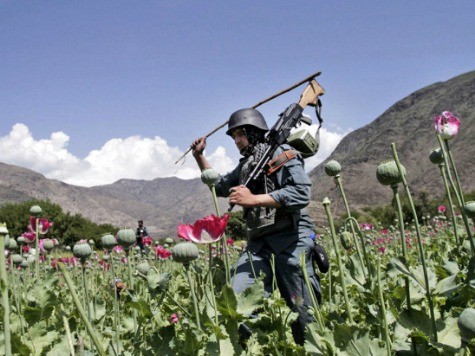The U.S. inspector general for spending in Afghanistan told the Senate Caucus on International Narcotics Control that Afghanistan’s opium “crisis” is a U.S. national security concern because it destabilizes the country’s economy and it nourishes insurgent groups like the Taliban.
Top officials from the U.S. Drug Enforcement Agency (DEA) and the U.S. Department of Defense (DOD), who also testified, echoed the inspector general’s comment.
“Even though little of this opium hits American shores we all know that the narcotics crisis in Afghanistan is a national security concern because it distorts the Afghan economy, poisons its banking sector, fuels a growing illicit economy, undermines the legitimacy of the Afghan government by stoking corruption, nourishing criminal networks, and providing approximately 30 percent of the financial support to the Taliban and other insurgent groups,” John Sopko, the U.S. government’s special inspector general for Afghanistan reconstruction told the panel during a hearing yesterday. “It also puts at risk the fragile reconstruction gains we have made over the last 12 years whether in health, education, women’s issues, rule of law, or governance.”
“Yet despite the growing threat of the narco-terrorist, [and] criminal nexus, the United States and other Western donors have by and large made counter-narcotics a lower strategic priority,” he also said.
The inspector general told the lawmakers at the hearing that the opium problem in Afghanistan threatens the U.S. mission to prevent terrorist safe havens there.
“In conclusion, the Afghan drug problem is growing and threatens to undermine the overall U.S. mission to build a stable Afghanistan able to defend itself and prevent terrorist groups from establishing sanctuaries there,” said Sopko. “Absent effective counter-narcotics programs and an Afghan political will, everything we have been investing both in lives and treasure will be at risk.”
Erin Logan, the principal director for the office of the deputy assistant secretary of defense for counter-narcotics and global threats, indicated that victory in Afghanistan is contingent upon dealing with the drug trade.
“As we look at the future of Afghanistan, it is impossible to envision success without sustaining an Afghan capability to fight the violence and corruption created by the drug trade,” she said.
Furthermore, she added that the the heroin trade in Afghanistan is a threat to the U.S.
“In addition, we cannot ignore the growing threat to ourselves and our allies. Our Canadian partners estimate that 90 percent of the heroin on their streets comes from Afghanistan,” she told the senators. “They also believe they are seeing more heroin on their streets than their user population can absorb. We must all be sensitive to information like this when combined with the Governor of Vermont recently issuing a State of the State speech focused entirely on Vermont’s exploding heroin problem.”
“We must be vigilant about the possibility of Afghan-produced heroin becoming more available across the U.S.,” she also said, later adding, “our adversaries make good use of these [illicit narcotics] networks [in Afghanistan] to destabilize territories and hurt U.S. interests.”
Echoing most of the witnesses, James Capra, the DEA’s chief of operations, told the Senate panel that Afghanistan’s drug trade fuels instability and threatens security in Afghanistan by facilitating transnational organized crime and undermining the rule of law.
He went on to say that the Taliban receives millions annually from activity surrounding the narcotics trade in Afghanistan through taxation, protection, and extortion.
Sen. Dianne Feinstein (D-CA), the chairwoman of the Senate drug caucus, estimated that the Taliban receives between $100 and $150 million each year from the opium trade in Afghanistan. That is about one-third of the insurgent group’s estimated $300 million budget.
The Afghanistan reconstruction inspector general pointed out that for the most part, the U.S. counter-narcotics mission in Afghanistan has failed.
“If our [mission’s] goal was to decrease cultivation, we failed. If our goal was to decrease the production of opium… we have failed. If our goal was to cut down the amount of money going to the Taliban, we failed,” he said.
As Breitbart News previously reported, opium cultivation and production has boomed in Afghanistan during the U.S. occupation.
According to the DOD official who testified, DOD alone has spent $2 billion on counter-narcotics training and programs in Afghanistan since the war started in October 2001.
Overall, the U.S. has spent $570 billion on the Afghanistan war, she added.
She mentioned that 2,301 U.S. military service members have lost their lives and another 19,573 have been wounded in Operation Enduring Freedom, the official name of the Afghanistan war. The operation includes multiple countries, not just Afghanistan.
“We believe the fighting against illicit narcotics network moving Afghan heroin is vital, an important component in ensuring that we honor the sacrifices we’ve already made,” she added.
The U.S. inspector general who testified was troubled that “no one at our embassy or at [the U.S.-NATO led coalition force] could convincingly explain to me how… the U.S. and coalition efforts are making a meaningful impact on the narcotics trade now… or after the 2014 transition.”
Sopko said that when combat operations conclude at end of 2014, the NATO-led training mission will lack the “resources and capacity” to support counter-narcotics missions.
“The [opium] situation in Afghanistan is dire with little prospect for improvement in 2014 or beyond,” he added in remarks prepared for the hearing.
“The people I spoke with in Afghanistan in my last few trips talked about two possible outcomes following the 2014 transition in Afghanistan: a successful modern state, or an insurgent state,” he also stated. “However, there is a third possibility: a narco-criminal state. Absent effective counter-narcotics programs and Afghan political will to seriously tackle this grave problem, that third outcome may become a reality.”
Afghanistan opium proceeds “support both the insurgency against the Afghan government as well as criminal and terrorist activities here in this country or directed against this country,” said Sen. Chuck Grassley (R-IA), the Senate drug caucus’ co-chair, during his opening remarks.

COMMENTS
Please let us know if you're having issues with commenting.